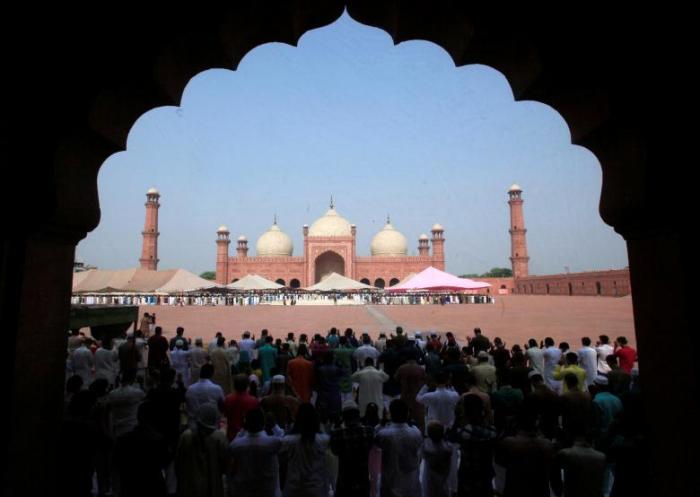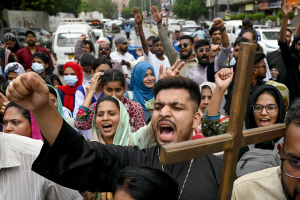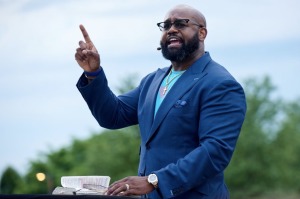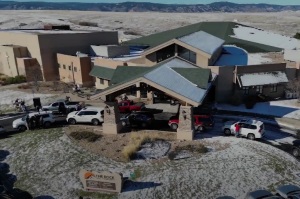Brother of Christian imprisoned in Pakistan on blasphemy charge pleads for Biden to help

A United States citizen whose brother is facing the possibility of being sentenced to death in Pakistan on trumped-up blasphemy charges is asking the Biden administration to put pressure on Pakistan to release his brother.
In three months, 47-year-old Pakistani Christian man Nadeem Samson will go before Pakistan’s Lahore High Court as he petitions against blasphemy charges that stem from and were cemented by a false accusation, corrupt police, and his own confession under torture, his brother, Shakeel Anjum, told The Christian Post.
On Nov. 24, 2017, a man named Abdul Haq told Pakistani police that Samson had opened a fake Facebook account where he allegedly posted blasphemous material. He asked for an immediate police raid on Samson’s home to catch him in the act.
Police captured Samson and a police report claims that he admitted to the crime.
But according to his Anjum, it was all a setup.
Anjum explained that Samson leased his home from Haq and was planning to move away. But Haq wanted to keep Samson’s $4,000 deposit for the lease. Anjum believes that Haq created the Facebook account using Samson’s phone number.
Then, Haq bribed the police, he said.

Police beat Samson for three days until he admitted to the crime, the brother recalled. When Samson appeared in open court in 2018, people physically attacked him, he said. Now, Samson attends his court hearings online from within prison.
“I’ve been fighting for my brother,” Anjum said. “After one year of the lease, the owner had to pay him $4,000. But the owner chose not to do that and instead invent this conspiracy. He paid the police and he made it a cybercrime.”
Anjum has lived in the U.S. since 2012. He entered the U.S. as a permanent resident after marrying an American and later became a U.S. citizen.
He told CP that police don’t allow him to speak with his imprisoned brother by phone, so he depends on a network of Pakistani friends who visit Samson in Lahore’s District Jail.
Anjum said he has worked with the U.S. Commission on International Religious Freedom to publicize his brother’s case. Other human rights groups usually don’t visit people imprisoned for blasphemy, he said. He has appealed to the Biden administration to put pressure on Pakistan to release his brother.
“We are not free to pray. We do not say anything and we are charged for blasphemy,” said Anjum of Christians in Pakistan. “This is a question of genocide of Christians in Pakistan. They just destroyed three years in trial. They are destroying the lives of blasphemy victims.”
Irregularities in a police report prove Haq bribed police, Anjum said, noting that the report on his brother should have been signed by the Lahore chief of police but it wasn't.
Instead, the report was signed by a lower-ranking inspector who did not have the authority to log the report. Anjum said police never investigated this signature.
Three years after the case was filed, Haq produced three more police witnesses against Samson, Anjum said.
“There were eight witnesses against my brother. They were all paid-off police officers. This year, after three years, they are adding three more police officers as witnesses,” Anjum added. “In any case when you add more witnesses after three years, your previous accusation has to be false, it’s not correct.”
Samson has officially been charged under section 295-C of Pakistani’s criminal code.
The death threats and extremist pressure that often exist during a blasphemy trial in Pakistan mean that Samson will be convicted by the lower courts because judges fear they will be killed unjustly by Islamist radicals if they don’t give Samson the death penalty, Anjum believes.
Pakistan ranks as the fifth-worst country in the world when it comes to Christian persecution, according to Open Doors USA’s 2020 World Watch List. Pakistan has imprisoned as many as 200 people on blasphemy charges, Pakistani rights activist Shaan Taseer said during the U.S. State Department’s 2019 Ministerial to Advance Religious Freedom.
Samson will petition Pakistan’s High Court, where the judges have bodyguards and might make a fair decision, said Anjum. The High Court system has ordered lower courts to finish Samson’s case in three months.
On Dec. 12, Samson’s lawyer, Asad Jamal, was supposed to petition the High Court for bail. Instead, he withdrew the request for bail. Three weeks later, Anjum said Jamal told him the court had rejected the request for bail. It’s unclear why he didn’t request bail for Samson.
“He didn’t tell us. He didn’t tell the victim. The attorney never visited in the jail,” Anjum explained. “They never told me what was going on.”
Samson and Anjum are both Catholic, and Pakistan’s Catholic Commission for Justice and Peace is funding his legal defense. However, the CCJP did not respond to Anjum’s calls about legal issues or tell him his lawyer withdrew the bail request, he said.
“The CCJP didn’t tell me what’s been wrong. I was calling the CCJP. I’m responsible for everything concerning the case and fighting for my brother. ‘Please, you have to give me evidence,’ I said. They are not returning my calls, they are not returning my emails,” said Anjum.
A source with knowledge of the situation who requested anonymity told CP that Jamal is a great lawyer and one of the few Muslim lawyers willing and capable of working on blasphemy cases. The source also said that CCJP has also done great work and thinks withdrawing bail is likely part of a legal strategy being employed by Jamal.
In Pakistan, accusations of blasphemy need not be proven to tear through someone’s life. Many radicals in the country consider the crime so horrible that they attack anyone accused.
“[Samson] says he is not free,” said Anjum. “My brother is unmarried. He has no kids, no wife. [Because of the accusation,] he cannot start his career, he cannot start his own business. [People accused of blasphemy] have no career. They have no life. They have to leave their country to start a new life.”
Samson has already spent three years in a prison that does not have a dedicated medical facility, he said. Even if the court declares him not guilty, the process might take three more years.
Before he was thrown in jail, Samson sold herbal medicine. If he gets out, he will almost certainly have to flee Pakistan, much like fellow blasphemy victim Asia Bibi did after she was acquitted by the Pakistan Supreme Court after spending over a decade in prison.
Pakistan is recognized by the U.S. State Department as a “country of particular concern,” designating it as a country that tolerates or engages in egregious violations of religious freedom.
During the 2019 State Department Ministerial to Advance Religious Freedom, a U.S. National Security Council official said that there are more people imprisoned for blasphemy in Pakistan than in all the other countries in the world combined.
Under the Trump administration, the State Department issued statements of concern blasting countries that maintain laws criminalizing blasphemy, apostasy or language that might insult religious sentiments.
“We see governments using such laws to wrongfully imprison and punish individuals whose views on matters of religion or belief may differ from official narratives or the views of majority populations,” a 2019 statement of concern reads.
Anjum and Samson have a younger brother named Michael who also lives in Pakistan. He’s currently dodging death threats by moving from place to place, Anjum detailed. He depends on Anjum to provide for his needs.
“Michael got threats and he got penalized [after the blasphemy accusation],” said Anjum. “He’s in hiding. I have to save his life and his children’s lives.”





























